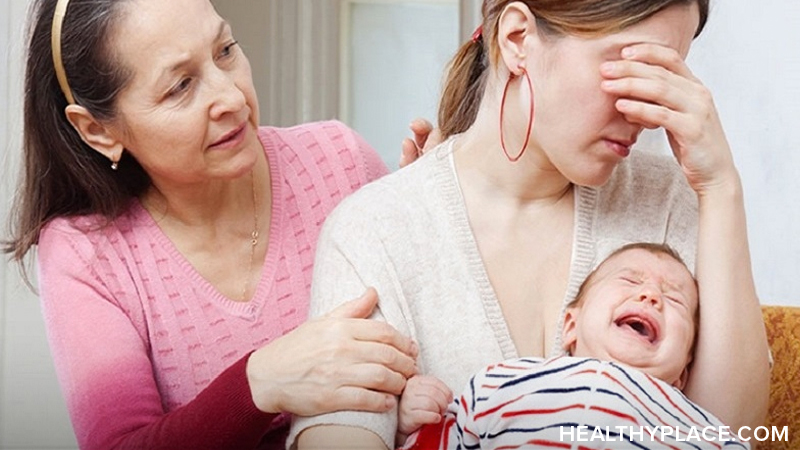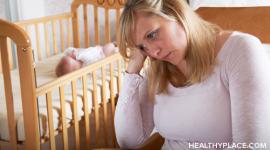Causes of and Risk Factors for Postpartum Depression

Have you wondered about postpartum depression causes and risk factors? If you have postpartum depression (PPD), or are pregnant and worried about developing it, wanting to know the cause and risk factors is natural.
Postpartum depression is an illness with symptoms similar to other forms of major depression. The difference is that much of PPD is specific to childbirth and affects both you and your newborn. Symptoms can begin in pregnancy; more often they develop after childbirth.
Symptoms include lasting sadness that weighs you down, loss of interest in activities and people—including your baby—inability to feel pleasure and the joys of mothering an infant, feelings of guilt and worthlessness, and thoughts of suicide, self-harm, and sometimes harming the baby.
Before we explore the causes of and risk factors for postpartum depression, it’s important for you to know that you are most definitely not the cause of your PPD. The symptoms are thoughts, feelings, and behaviors you experience because of PPD.
Even experts in the field of mental illness agree. Professionals at the National Institute of Mental Health note that “Postpartum depression does not occur because of something a mother does or does not do.” (Postpartum Depression Facts, n.d.).
You’re not the cause, nor is your baby. Let’s examine the real causes and risk factors of this birth-specific depression.
Postpartum Depression Causes
The exact cause of postpartum depression is unknown. Researchers do know that there can be multiple causes or contributing factors, such as
- Genetics
- Hormonal fluctuations
- Sleep Deprivation
Postpartum depression might be genetic. Having a mother or a sister who went through this type of depression can sometimes be a cause of PPD. Not every woman who has an immediate family member who had PPD also develops this disorder, which means that genetics isn’t always a cause.
Hormonal changes play a significant role in the development of PPD. After giving birth, a woman’s body prepares to return to a non-pregnant state by suddenly decreasing estrogen and progesterone levels. The rapid and drastic hormonal changes can cause changes in the brain that lead to mood swings, anxiety, and depression. Further, birth control pills taken soon after childbirth can contribute to hormonal fluctuations that sometimes cause or aggravate PPD.
Sleep deprivation can also be a cause of PPD. A decrease in both the quality and amount of sleep after a baby is born is the rule rather than the exception. Lack of restorative sleep makes it hard for the brain and body to recover from pregnancy and childbirth. The exhaustion interferes in brain functioning, making lack of sleep a major postpartum depression cause.
Sleep deprivation and hormonal changes are common to every woman who gives birth. Genetics is behind PPD for some women. Yet not everyone gets postpartum depression. Approximately 15 percent of women develop it. Something else must contribute to PPD in addition to genetics, hormonal changes, and sleep deprivation. Other things, known as risk factors, can increase the chances that a woman will get PPD.
Postpartum Depression Risk Factors
The following situations, while they don’t cause PPD, increase a woman’s risk for developing it:
- Having had difficulties getting pregnant
- Delivering multiples
- Complications during pregnancy and/or childbirth
- Premature delivery
- Health problems that cause the baby to be hospitalized
- Stressful life events occurring during pregnancy or after childbirth
- Depression or anxiety during pregnancy
- PPD with previous deliveries
- Previous mood disorders
- Thyroid imbalance
- Lack of support
- Substance use
Demographics can be a postpartum depression risk factor as well. Studies have shown that women experiencing these conditions are more prone to having PPD:
- Financial hardship and/or below average income
- Unwanted pregnancy
- Single motherhood
- A young age
While researchers have identified things that can cause or increase the risk of developing postpartum depression, there isn’t one single factor that undoubtedly causes PPD. The exact reason for a woman’s postpartum depression isn’t always known. That’s okay, though, because even without knowing the cause, you can treat and manage your PPD and thrive. You can bond with your baby and enjoy their growth.
APA Reference
Peterson, T.
(2022, January 3). Causes of and Risk Factors for Postpartum Depression, HealthyPlace. Retrieved
on 2026, January 11 from https://www.healthyplace.com/depression/postpartum-depression/causes-of-and-risk-factors-for-postpartum-depression



